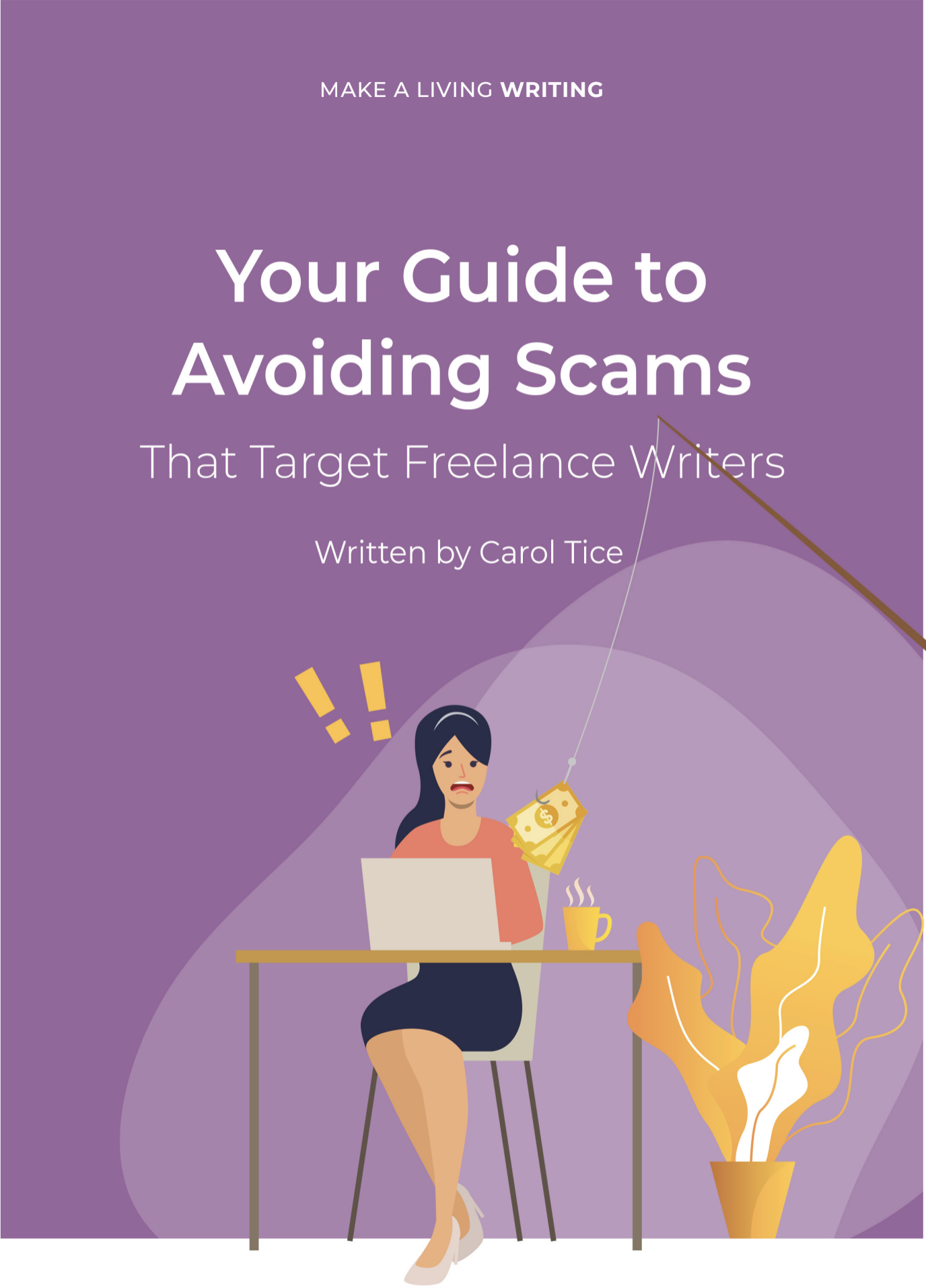Make piles of money writing from home…even if you don’t have any experience. Yep, hucksters are out there and there are scams that target freelance writers every…single…day.
Have you ever wondered if a freelance-writing opportunity you’re looking at is a scam?
It certainly could be. Scams that target freelance writers are common. Some of these rip-offs are age-old and never seem to go away. New ones are always emerging, too-got a new wrinkle for you in this post.
These scams aren’t all about getting jobs, either. There’s shady activity in PR help for freelance writers, online learning, and more.
Often, freelance writers can be too trusting, as we seek to ply our trade. Sadly, there are plenty of people out there ready to take advantage of our trusting nature for their own gain.
Please don’t get scammed!
In this post, we’re covering three of the most common scams that target freelance writers online
For the full list (Top 10), download this free e-book, where we’ll also send you a Scam Fighting Toolkit.

1. Writing for free
There are many “opportunities” to write for free online. You’ll get a lot of pitches that your free piece will give you “great exposure.” Most of these offers are a complete waste of your time and energy.
The most common scam is the request to write a free trial article as an audition for a job. Unless you have no clips, you shouldn’t have to do this—prospects can just look at your samples and decide whether to hire you.
All too often, companies fill all their content needs by simply asking many freelance writers to do these “auditions.” These free samples are their whole source of content. They don’t really plan to hire anyone.
If you get asked to write a free sample, ask yourself if it’s worth your time.
A good counter-offer is to write the piece on spec-namely, that if they use the clip you’ll be paid. There’s no justifiable reason why your first piece should be unpaid, if it’s good enough to publish.
2. Pennies for ad-clicks
Somewhat similar to Medium’s formula, you may find sites that offer an “opportunity” to write for what they promise will be pay.
But the pay model is based on how often readers click on the ads next to your posts, or how many views a post gets.
Most of the sites making these offers have little traffic, so no clicks will happen. Also, have you noticed that people generally hate online ads? Real diminishing returns there, in general.
This is a formula that may have worked 15 years ago, but few sites today are good pay-per-click earning opportunities.
There is a legit way to earn based on traffic or ad clicks: That’s with a minimum-pay guarantee, with click or eyeball revenue figured in as a bonus. I earned well writing for Forbes on this formula at one point (sadly, their pay scheme is different now).
Any site that really generates high traffic should be willing to offer you some base pay, since they know you’ll get some traffic. If they won’t pay a flat guaranteed fee in addition to click revenue, I recommend you move on.
3. Pay to play
This is one of the oldest scams out there. It’s so popular that the FTC warns against it.
“Congratulations, your resume shows you are qualified for X contract job! Just pay the $30 application fee and you’ll be hired.” Nope. Total scam.
Legitimate employers don’t ask you to pay to apply or to get hired for their job.
Nuh-uh.
Also, consider this gray area: the websites that promise you unique lists of freelance jobs, if you’ll pay a monthly subscription fee. (Red flag: No samples will be offered, no free trial. No other benefits, just job lists.)
Heads up: Most of those job ads are simply scraped up from the Internet that you could look at yourself, for free. And most of them pay $20 per blog post.
When job listings are worth a fee
A paid jobs list should be unique and high-quality like FlexJobs, which does an impressive job of digging up legit jobs off arcane places you’ll never find on your own.
A time-saving list of high-paying gigs is worth a fee, in my view. Most pay-to-play sites serve up warmed-over junk listings.
Save your money, do your own research—and remember that online job ads are rarely a source of great freelance-writing jobs. That only comes from qualifying and pitching your own prospects, who aren’t sifting through 500 resumes from a mass job ad.
Remember, if it sounds too good to be true…it usually is.
It’s your freelance business to run. Be a good steward of your time and resources and do your homework before you jump on any offers, whether they’re for jobs, marketing help, or courses.
Be your own scam-buster!
It’s a great time to be a freelance writer, because there’s a ton of great opportunity out there…but if you waste time falling for scams, it’s hard to earn well. I hope you can use this guide to avoid getting ripped off, so you can spend more time finding great clients.



